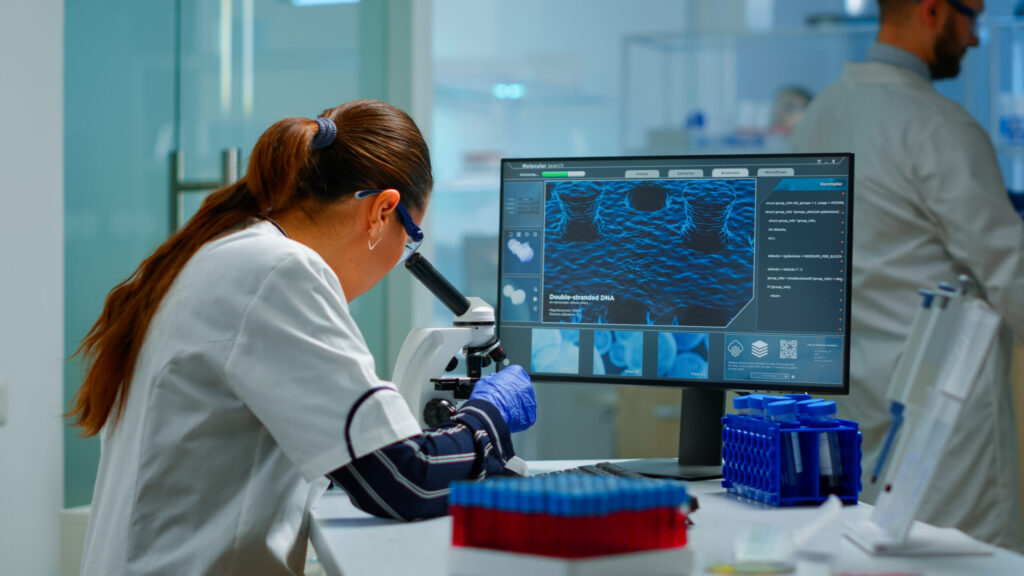The genetic diagnosis process is not an easy one to navigate. For many potential rare disease patients and their families, understanding the different stages of the process can help make it a less stressful experience.
When might someone decide to start the genetic diagnosis process?
- If there is a known history of a rare disease, or gene change, in a family.
- Before planning a pregnancy, or in some instances couples undergo genetic testing before getting married.
- After initial genetic testing has returned positive results for a gene change or rare disease marker.
- Due to symptoms or features, including facial features, or medical conditions, that have no known identifiable cause, and together might suggest a rare disease or genetic cause.
What are the main steps in the genetic diagnosis process?
Genetic Counseling
Genetic counseling should be the first step of the process, but it is not a stand-alone step. Genetic counseling should accompany anyone undergoing genetic testing throughout the entirety of the process.
Once an individual, couple, or family decides to start the process, a genetic counselor should be consulted. This initial consultation can determine the accuracy, and success of the entire genetic diagnosis process, and should not be skipped.
During an initial meeting with a genetic counselor, patients will be asked to provide all details of their own medical history, as well as information about their family medical history. They will also be asked to explain and describe any potential symptoms and features, and their reasons for wanting to start genetic testing.
As part of this step, a genetic counselor will explain the genetic diagnosis process, and what it will entail. This will include information about potential testing options, as well as possible diagnoses from this testing. A genetic counselor will provide essential emotional support as well, throughout a process that can be complicated, long, and stressful.
They will also provide a patient, and their family, with their recommendations for which genetic testing options to proceed with, based on their expert opinion and experience.
Genetic Analysis & Testing
Genetic testing will be recommended to patients based on their medical history, their family medical history, their current symptoms, and the expert opinion of their genetic counselor.
There are many types of genetic tests available, some of which are invasive (and require a blood sample, or sample of amniotic fluid around a baby), while others are non-invasive, and involve facial screening technology.
The different types of genetic tests include:
- Prenatal genetic testing both invasive and non-invasive
- Newborn screening tests
- Facial analysis of key markers for genetic syndromes
- Genetic testing for specific gene changes, or syndromes
- Genetic testing of parents-to-be (carrier screening)
Genetic Diagnosis
Receiving a confirmed genetic diagnosis is the primary goal of the entire diagnostic process. However, how accurate this diagnosis is, and how long it takes to receive it, is dependent on access to quality care, and targeted testing in the stages prior to a diagnosis.
But once a patient has a confirmed diagnosis, the next step is support in managing their condition, in the long term. For many rare disease patients, a diagnosis is often the first step in what becomes a lifelong process to manage their rare disease and its symptoms. It will be followed by more support through continued genetic counseling, as well as recommendations for possible treatment options, and other avenues of support.
Support after diagnosis
While a confirmed diagnosis may end the genetic diagnosis process, at the same time, it also starts a new process- the long-term management of a rare disease. Successful management requires coordination and cooperation between all of those involved in caring for a rare disease patient, and usually this cooperation is coordinated by a genetic counselor. One of their main roles, following a diagnosis, is to coordinate the care of a rare disease patient and to ensure consistency across it. They are also able to translate medical terms, jargon ,and procedures for patients and their families, so that they are better able to understand their own care needs.
What is the future of the genetic diagnosis process?
There is currently something of a transformation occurring in the diagnosis of rare diseases. These developments aim to improve the process, in terms of making sure it results in a more accurate diagnosis, and in terms of making it faster, easier to navigate, and much less stressful for rare disease patients and those supporting them.
Many parts of the process, specifically genetic counseling, are moving online. This is in part to address issues of accessibility, and location challenges for many patients. There is also a growing global outlook to the process, allowing for the coming together of genetic experts, and patients, in order to increase awareness about, and research into genetic syndromes. There are also advancements involving new AI technologies that are able to deliver faster, more accurate analysis solutions directly to patients.
For now these new developments are not radically changing the process of genetic diagnosis, but they are working together to speed up the process, ensure it is more accurate, and provide better support and treatment for rare disease patients.



